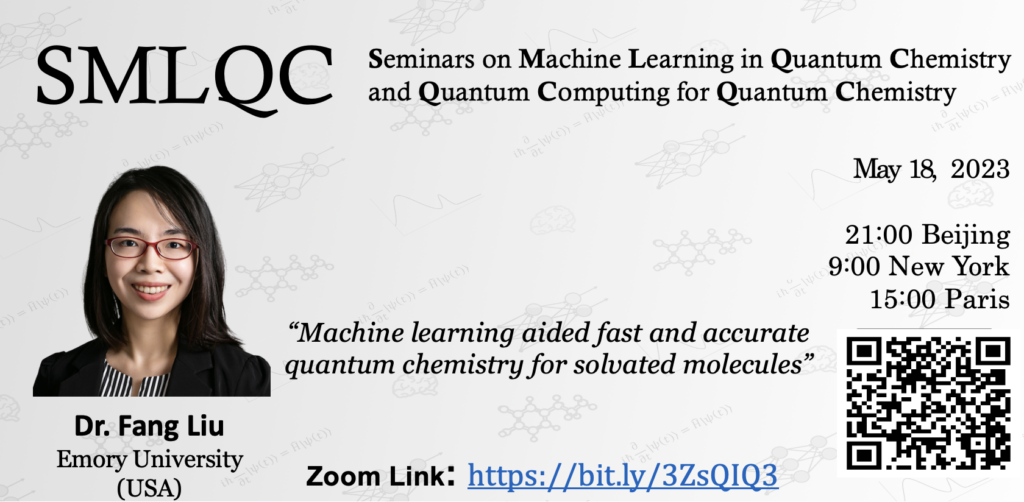The 7th SMLQC seminar will be given by Fang Liu on May 18, 2023 (15:00 Paris | 21:00 Beijing | 09:00 New York).

Title
Machine learning aided fast and accurate quantum chemistry for solvated molecules
Abstract
The fast and accurate description of the solvent environment is crucial for quantum chemical (QC) discovery in the solution phase. We combine high-performance computing hardware and machine learning (ML) techniques to improve the efficiency and accuracy of QC discovery of solvated molecules. To improve the efficiency, we developed strategies to accelerate both the implicit and explicit solvent models. For the implicit solvent models such as the conductor-like polarization model (C-PCM), we exploited graphical processing units (GPUs) to accelerate the calculation and achieved hundreds of speedups for ground- and excited- state calculations. For the explicit solvent model, we developed AutoSolvate, an open-source toolkit to streamline the QC calculation workflow of explicitly solvated molecules. To improve the accuracy, we develop ML models to reduce the discrepancy between experimental measurements and computationally predicted molecular properties in both implicit and explicit solvent models. For ground-state redox potential calculations, our ML models can reduce both the systematic bias and the number of outliers, and the ML corrected results demonstrate less sensitivity to density functional theory (DFT) functional choice. This ML correction technique is transferrable to predicting other molecular properties in the solution phase, including the excited state redox potential and absorption/fluorescence wavelength.
Introduction to the speaker
Dr. Fang Liu is an assistant professor at the Department of Chemistry, Emory University. Her research focuses on developing algorithms to accelerate quantum chemistry calculations on GPUs and using machine learning to accelerate chemistry discovery. Dr. Liu obtained her B.S. in Chemical Physics at the University of Science and Technology of China in 2011, and Ph.D. in Chemistry at Stanford University in 2017. She did postdoctoral research in MIT from 2017 to 2020 and joined Emory University in 2020.
How to join
Join Zoom Meeting
https://zoom.us/j/86004422973?pwd=WjNKQlEydmdFL3hJbUx4NjByYjVJZz09
Meeting ID: 860 0442 2973
Passcode: 703098
